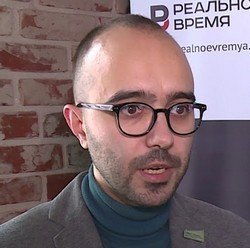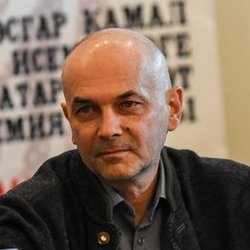Kamal Theatre joins conscription into alternative army
37 people were conscripted into alternative civilian service in Tatarstan in 2019
As Realnoe Vremya learnt, it has become possible to see alternative service not only in the hospital or post office but also in the theatre for the first time in Tatarstan since 2020. Alternative conscripts in Tatarstan are traditionally expected in the administration of Tatarstan Post, Kazan and Yelabuga Psychoneurological Care Homes, Menzelinsk Care Home for the Elderly and People with Disabilities. Now the Kamal Theatre is waiting for them too.
Theatre instead of barracks
As far as it is known, one can do one’s duty for the Homeland not only by parachuting and shooting a rifle. The list of jobs and positions for citizens who don’t want to serve in the army has bartender, fur farmer, waiter, hairdresser, babysitter, gardener and a section of vocational and engineering specialities. There are more interesting jobs for conscripts — as a doctor, fitness instructor, teacher, jurist, ballet artist, actor, accompanist, vocal singer (soloist), organiser of cultural events. In a word, one can serve in the Armed Forces standing in front of a machine tool or a dentist’s chair.
State organisations whose positions have been vacant for years are filling applications to the Ministry of Labour of the Russian Federation. It accumulates them on a separate list, assigns quotas and distributes candidates. This list traditionally contains about 500 state-owned companies from different regions of Russia. Russian Post submits the biggest number of applications, the list has a lot of social institutions too. But the Tatar State Academy Theatre named of G. Kamal has been in the order of the Ministry of Labour of the Russian Federation for the first time.
“Rarity”
As Realnoe Vremya found out, the quota in the theatre isn’t given to an actor (there are just two quotas in total across the country) but stage machinists. The theatre has taken advantage of such an opportunity for the first time.
According to Vice Marketing and PR Director of the G. Kamal TSAT Ilshat Latypov, the future conscript now studies at Kazan State University of Architecture and Engineering and works as stage machinist. Due to the rarity of this job, the administration of the theatre would like to keep him in this position.

The theatre plans to seek an opportunity to see alternative service for drama artists too in the future, the interlocutor of the newspaper said.
As Chief Director of the theatre Farid Bikchantayev told Realnoe Vremya, the team of stage machinists that includes eight people has recently been updated, several young specialists have joined it.
“The speciality as stage machinist is rare. It is hard, scrupulous manual labour: they assemble and demount decorations in the small and big halls, work with them during a play, take care of automatic traps. There is a lot of job on a computer; construction skills, the sense of rhythm and tact are needed. When a new play is staged, they compulsorily have to get familiar with the staging. Also, it is a responsible job linked with human life, safety. There have been different cases — decorations fell, collapsed,” Bikchantayev described the profession’s specifics.

30-40 Tatarstan residents choose alternative service a year
Besides the theatre, Tatarstan conscripts will also work in the administration of Tatarstan Post, Kazan and Yelabuga Psychoneurological Care Homes, Menzelinsk Care Home for the Elderly and People with Disabilities this year.
“30 young people already see alternative service in seven post offices of the region as post operators and mail carriers in Tatarstan at the moment. They are provided with working conditions in accordance with current legislation of the Russian Federation. A worker is paid a full salary for the position, holidays and paid sick leave, necessary training during the full term of service,” head of the Department of Internal Communications of Tatarstan Post Evgenia Doronina told Realnoe Vremya.
According to data of the Military Commissariat of the Republic of Tatarstan given at a press conference at the end of the conscription, 37 people were conscripted into alternative civilian service in Tatarstan last year. Moreover, the number of young people who chose this type of duty for the homeland in autumn rose five times compared to the conscription in spring. But this happens because former school graduates are conscripted in spring, there aren’t a lot of pacifists among them.
Conscripts from Tatarstan last year went to the Engels Care Home for the Elderly and People with Disabilities, Samara State College, Nizhny Novgorod Boarding House for Veterans of War and Labour, offices of Russian Post, rehabilitation centres for children and teenagers with disabilities, Military Commissar of the Republic of Tatarstan Sergey Pogodin said then.
He assured that military commissariats aren’t an obstacle to young people who want to see alternative civilian service. As it is mainly hard and not prestigious types of work, it is hard to find staff for it, because of low salaries too.
“Everybody can submit an application to the military commissar to the commissariat at the place of residence six months to the next conscription. It is necessary to provide corresponding evidence that military service contradicts his beliefs or religion,” Pogodin clarified the terms.
We will remind that if a conscript soldier sees service for a year, but a soldier doing his alternative duty does for 21 months. However, he lives at home, and his free time doesn’t differ from that of his “civilian” peers. To obtain an alternative conscription card, it is necessary to submit a claim in the commissariat, autobiography and provide characteristic from an educational institution or place of work.
No need to prove you are vegan or pacifist
Human rights activist German Alyotkin confirmed Realnoe Vremya that military commissariats in general were quite tolerant to young people “with beliefs” if they could clearly explain them on paper. It is by far easier for believers. They can invite religious clerics as witnesses to confirm that the young person regularly goes to a church or mosque.

According to Alyotkin, a dedicated opponent of military service can be denied if an application was submitted late. Though for good reasons, it can be postponed too — there is a special rule of the Constitution Court for this. But young people are bad at laws, while some simply aren’t aware of the existence of the opportunity and change their mind when conscription was announced.
“They must be told about it at school in Civic Studies or Health and Safety Training Course. But the youth don’t think about it. And here it begins: “You missed the term,” as if it is the foundation to deny a citizen his constitutional right. Why was this norm introduced? I participated in the creation of the law, it was introduced at the last moment at militaries’ insistence. Nobody understands why this norm is needed, but they still have been failing to introduce changes to the law,” the human rights activist complains.